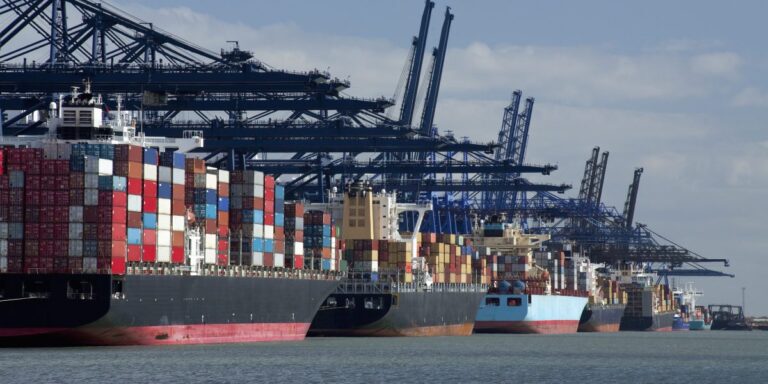
Friends who trade together stay together. This is the mantra that seems to increasingly dictate global trade dynamics, to the benefit of the resurgence of the European economy.
EU trade surplus with US hit record 43.6 billion euros ($47.3 billion) in first quarter of 2024, official says the data shows. The 27% jump from the same period last year reflects both an increase in exports to the US and a reduction in imports to the EU.
With overall levels of transatlantic trade on a long-term upward trajectoryThe growing trade gap in favor of the EU reflects a few trends that are unlikely to disappear anytime soon.
Closer ties between the United States and Europe
First, U.S. businesses and consumers could buy more in Europe in response to rising trade costs with China after the White House upped the ante in its long-running trade war with that country.
The Biden administration imposed a 100% tariff on Chinese-made electric vehicles last week as part of a move to protect the market share of U.S. automakers, with retaliation widely expected from the Chinese government.
Faced with the trade war between the United States and China, European imports could suddenly seem more attractive, despite generally higher costs. It doesn’t hurt that U.S. consumer demand remains buoyant.
On the other side of the equation, the EU’s declining demand for US products likely reflects the tough times facing the continent.
The German economy, the traditional engine of Europe, has suffered in recent years, due to the decline of the manufacturing sector. Vladimir Putin’s invasion of Ukraine and subsequent sanctions worsened the situation by cut off Germany cheap Russian oil and gas on which it depended to fuel its industries.
Across Europe, spiraling inflation and rising interest rates have hit consumer confidencewhich remains around levels last seen during the Great Recession of 2008/09.
The growing surplus is therefore explained “by the strength of US domestic demand and the weakness of European demand”, declared Andrew Kenningham of Capital Economics. summarized in FT.
It will, however, be interesting to see whether the changes in the fortunes of the two economies will affect trade flows during the rest of the year.
While the Eurozone experienced more prohibitive levels of inflation at the height of the cost of living crisis, it I was able to control the prices faster than its American peers, with the European Central Bank expected to cut rates in June.
Major banks, including Morgan Stanley and UBS, now expect US consumption to slow as the average European begins to benefit from falling prices and interest rates.
Europe also hopes to address a growing trend of European capital is flowing to the states. Major German companies, including Volkswagen and Mercedes-Benz, committed a record $15.7 billion in investments to the United States last year, nearly triple the 2022 figure.
EU versus China
Although the EU is currently benefiting from the US abandonment of Chinese products, it is also experiencing difficulties in its economic relations with China.
The EU’s trade deficit with Asia’s largest economy fell to a three-year low of 62.5 billion euros ($67.8 billion) in the first quarter of the year.
The bloc risks fueling its own trade war with China, with a row over alleged state subsidies to the manufacturing sector following an influx of cheap goods onto the European market.
In September, European Commission President Ursula von der Leyen accused China of distorting the European auto market by subsidizing automakers such as BYD and Geely.
European Commission investigators visited car manufacturers’ factories as part of an investigation into anti-competitive practices.
The EU should follow the United States impose tariffs on Chinese electric vehiclesalthough they are not expected to come close to the level imposed by the Biden administration, due to closer trade ties with the region.
Indeed, speaking on Tuesday in Brussels, von der Leyen said the EU did not want to start a trade war with China, choosing more diplomatic language.
“I don’t think we are in a trade war… We are reducing risks from China, we have decoupled from Russia,” von der Leyen said.
“We know that the world is changing, we know that competition is getting tough. But the single market is our refuge, so let’s strengthen it,” she said.
Either way, it appears that the trend of “friendshoring” between the United States and Europe will only increase, perhaps to the benefit of the EU.


